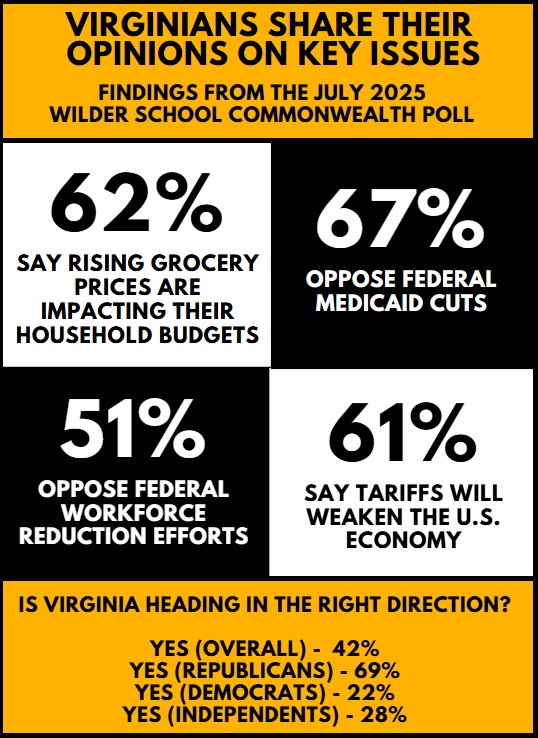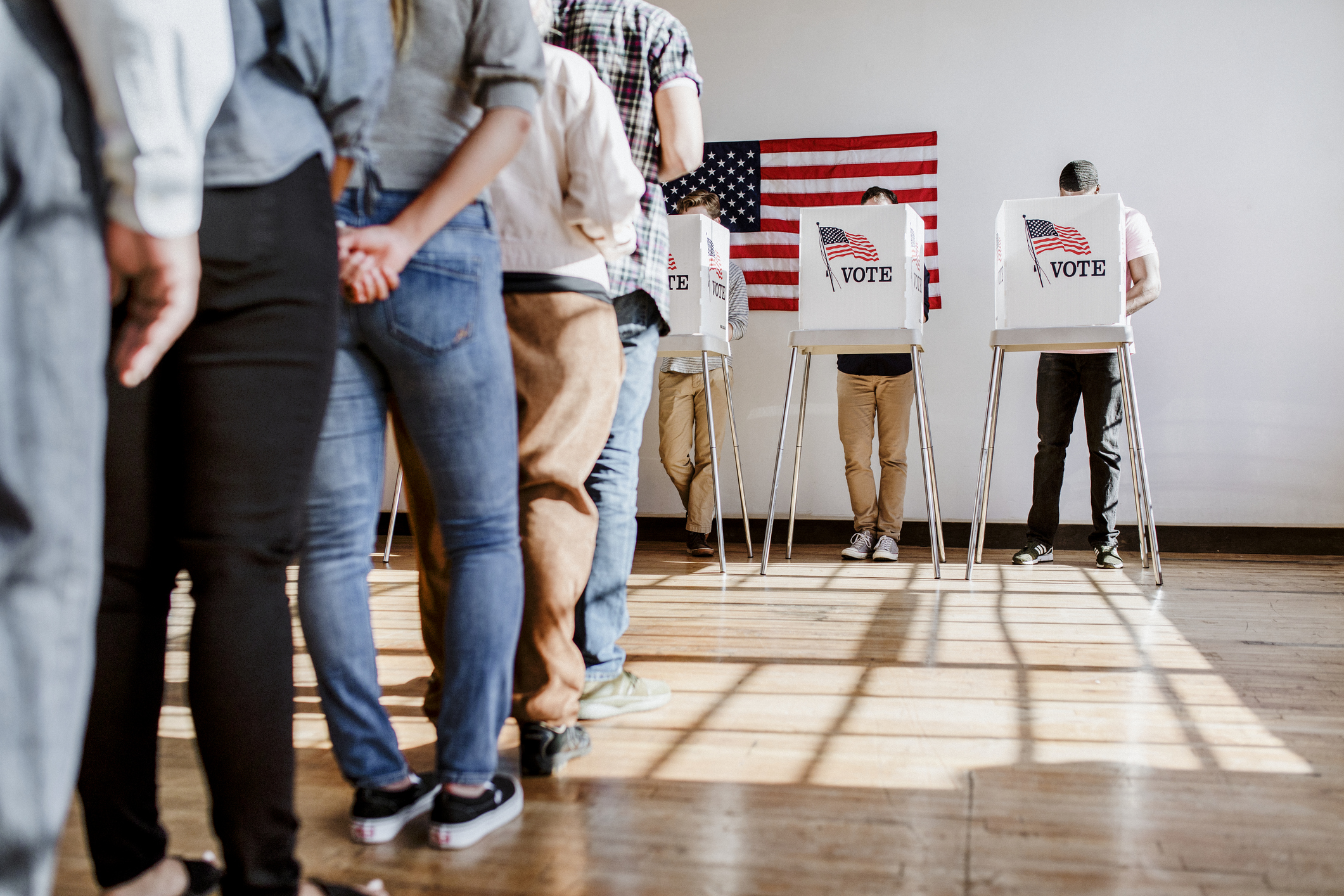CONTACTS:
L. Douglas Wilder
Distinguished Professor
804-827-0776
ldwilder@vcu.edu
Robyn McDougle
Associate Dean of Research and Outreach
804-721-6703
rdmcdougle@vcu.edu
The Wilder School’s new survey also reveals partisan divides on DEI, immigration and federal workforce cuts.
RICHMOND, Va. (July 24, 2025) – Today, the L. Douglas Wilder School of Government and Public Affairs at Virginia Commonwealth University released findings from its latest Commonwealth Poll that show a mixed outlook among registered voters in Virginia on an array of topics: the direction of the commonwealth, economic anxiety, college affordability and key policy issues ranging from Medicaid cuts and immigration to tariff policies, DEI programs and transgender athletes. The findings reflect significant partisan divisions across most issues.

“Virginia has always helped define the course of this nation, and now in 2025, we are facing a defining moment once again,” said L. Douglas Wilder, the 66th governor of Virginia. “This latest poll reveals that 67% of Virginians oppose Medicaid cuts, 63% reject Governor Youngkin’s vetoes on affordable housing, and a majority disapprove of efforts eliminating diversity, equity and inclusion programs. Leadership is not measured by how loudly one appeals to partisan politics but how one protects people’s dignity, freedom, health and future. The people of Virginia are watching, and as always, they are ready to hold their leaders accountable.”
The poll, conducted between June 19 and July 3, surveyed 809 adults living in Virginia and has a margin of error of plus or minus 4.4 percentage points.
Direction of the commonwealth
Registered voters in Virginians are nearly evenly divided on whether the commonwealth is heading in the right direction (42%) or the wrong direction (38%). Party identity strongly shapes this view, as 69% of Republicans say Virginia is on the right track compared with just 22% of Democrats and 28% of independents.
Economic anxiety and college affordability
Cost-of-living issues continue to weigh on Virginians, with 62% of registered voters saying rising grocery prices are affecting their household finances — a concern shared broadly across party lines.
When asked whether the cost of an in-state four-year college degree is worth it, 48% say it is not, while 46% say it is. This compares with 43% of registered voters in the Wilder School’s 2024 winter poll who said the cost was not worth it and 41% who said it was. Democrats are more likely to see value in higher education (56%), compared with 34% of Republicans and 37% of independents. Among individuals ages 18 to 34 — those of college age or just past it — a striking 59% say the current cost is not worth it.
Support for major capital projects (buildings and expenses) at colleges and universities is split, with 41% in favor and 41% opposed, reflecting concerns about tuition and public spending.
Strong opposition to Medicaid cuts and housing vetoes
A clear majority of registered voters in Virginia (67%) oppose proposed federal Medicaid cuts that could affect hundreds of thousands of residents. While support for the cuts is higher among Republicans (47%), it remains a minority position for the party affiliation. Opposition is strong among independents (71%) and nearly unanimous among Democrats (94%).
Similarly, 63% of registered voters in Virginia oppose Gov. Glenn Youngkin’s vetoes of affordable housing policies, including 90% of Democrats and 64% of independents.
Federal workforce, DEI and immigration
When asked about reducing the federal workforce to cut spending, registered voters in Virginia are divided, as 46% approve and 51% disapprove. Republicans overwhelmingly support the idea (80%), while Democrats (80%) and a majority of independents (53%) disapprove.
More than half of registered voters (56%) oppose eliminating diversity, equity and inclusion programs in government and institutions. Similarly, when asked whether federal funding for colleges should depend on eliminating DEI initiatives, 53% said federal funding should not be contingent, while 25% said it should.
A clear majority of Virginians (63%) disapprove of President Trump’s executive orders that, according to the Congressional Black Caucus Foundation, disproportionately impact Black communities — such as eliminating collective bargaining rights for federal workers, dismantling the Department of Education and defunding the Minority Business Development Agency. Among respondents, 53% strongly disapprove, while 29% approve.
On immigration, nearly half of respondents (47%) say illegal immigration at the Southern border is a major problem. That view is most pronounced among Republicans (82%) but also shared by 41% of independents.
Division on national issues
President Trump’s executive orders and tariff policies remain polarizing in Virginia. Only 30% of voters in Virginia approve of the executive orders, and 30% believe his tariff policies will strengthen the U.S. economy. These views break sharply along party lines.
Approval of Elon Musk and the Department of Government Efficiency (DOGE) also shows partisan splits. Though 38% approve statewide, the figure reflects 80% support of Republicans but just 4% of Democrats.
Broad agreement on transgender sports policy
One of the few issues with bipartisan alignment is transgender participation in sports, as 69% of registered voters in Virginia believe athletes should only play on teams that match their birth gender — a view consistent with last year’s results, when 60% of registered voters said the same. This year’s result includes support from 93% of Republicans, 71% of independents and 51% of Democrats.
About the L. Douglas Wilder School of Government and Public Affairs at VCU
Ranked in the top 15% of graduate schools of public affairs in the nation by U.S. News & World Report — No. 39 overall among public affairs schools, No. 6 in homeland security, and No. 33 in public management and leadership — the L. Douglas Wilder School of Government and Public Affairs at Virginia Commonwealth University advances excellence in governance and promotes evidence-based public policy across Virginia and beyond.
The school offers a range of graduate, post-baccalaureate, and doctoral programs in key policy areas, including criminal justice, homeland security and emergency preparedness, public administration, public policy and administration, and urban and regional planning.
Additionally, the Wilder School is home to robust Centers and Institutes for Public Policy, which provide applied research and services in state and local government, social equity and leadership to clients in government, nonprofit organizations, businesses and the general public. Learn more at wilder.vcu.edu.
About VCU
Virginia Commonwealth University is a major, urban public research university with national and international rankings in sponsored research. Located in downtown Richmond, VCU enrolls more than 28,000 students in more than 200 degree and certificate programs in the arts, sciences and humanities across VCU’s 12 schools and three colleges.
About the VCU Commonwealth Poll
For nearly three decades, the VCU Wilder School Commonwealth Poll within the Centers and Institutes for Public Policy has been an important bellwether for policymakers in Virginia and beyond on a range of topics, including voting intentions, economic and workforce development, education, housing, public health, public safety and racial equity. The Commonwealth Poll is a featured 2020 Presidential Election Poll by CNN, approved based on a rigorous review of methodologies and assumptions that ensure that CNN-cited polling entities are employing the gold standard in public opinion research.
Poll methodology
The Summer 2025 Commonwealth Poll, sponsored by Virginia Commonwealth University, obtained telephone interviews with a representative sample of 809 adults, ages 18 or older, living in Virginia. Findings referenced in this release reflect the views of 764 respondents who identified as registered voters. Telephone interviews were conducted by landline (80) and cell phone (729, including 558 without a landline telephone). The survey was conducted by Responsive Management. Interviews were conducted in English from June 19, 2025, to July 3, 2025.
In telephone survey research, design weights are often employed to reduce bias, correcting for differences in the probability of selection due to non-response and non-coverage. The sample was weighted in an exit poll design to match the 2021 Virginia electorate, that is, Virginia voters who voted in the 2021 gubernatorial election. The geographic and demographic weighting parameters were obtained from the 2021 Virginia CNN Exit Poll. Two sampling frames were employed: one frame representing those with a listed landline and a second frame consisting of RDD cellular numbers. A two-stage weighting procedure was used to weight this dual-frame sample. Weighting was accomplished using the Anesrake package, which implements the American National Election Study (ANES) weighting algorithm. The total sample design effect using the exit poll weighting design for this survey is 1.46 and the margin of error for the entire sample is ±4.16 percentage points.
A combination sample consisted of a listed landline sample and a cellular random digit dial (RDD) sample to represent all adults in Virginia who have access to a listed landline or cellular telephone. Both samples were provided in their proper proportions according to state telephone type usage by Marketing Systems Group, a leader in providing research-based statistical samples. The cellular RDD sample was prescreened for disconnected numbers.
As many as seven attempts were made to contact every landline telephone number, and as many as five attempts were made to contact each cell phone number. Calls were made at different times of day and different days of the week to maximize the chance of contacting potential respondents. Each telephone number received at least one daytime call when necessary.
In addition to the five attempted phone calls for each cell number, cell numbers that were not reachable in five attempts were sent a message via Short Message Service (SMS) with one final request to participate in the study. The SMS message contained a link that would lead the respondent to the internet survey. Of the 729 surveys completed with cell sample, 66 were completed using the link provided in the SMS message. For the landline sample, the computer questionnaire instructed interviewers to ask to speak with the youngest adult currently at home. Selecting respondents in this manner has resulted in data that closely mirrors the population’s age when combined with cellular sampling. For the cellular sample type, interviews were conducted with an adult who answered the telephone. Response rates were computed according to American Association for Public Opinion Research standards . Thus, the response rate for the landline sample is 6.0 percent. The response rate for the cellular sample is 8.8 percent.
.jpg)


.jpg)